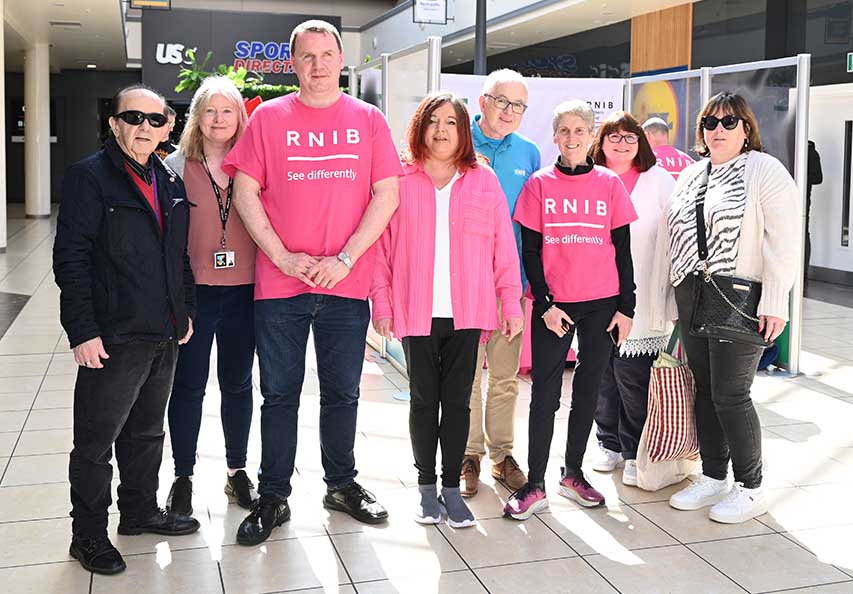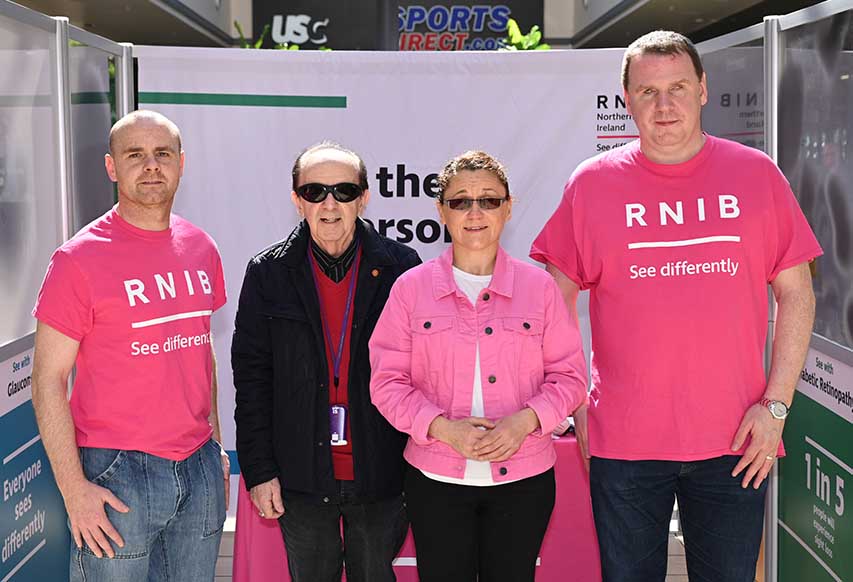#EyeCareWeCare roadshow comes to Newry
One in five of us will experience sight loss in our lifetime, but did you know that over 50 per cent of sight loss is avoidable?
On Tuesday 18 April, the Royal National Institute of Blind People (RNIBNI) brought it’s #EyeCareWeCare roadshow to Buttercrane Shopping Centre in Newry to raise public awareness of practicing good eye health and attending regular eye clinics.
There are an estimated 5,330 people living with sight loss in the Newry, Mourne, and Down area, with this figure expected to rise by over 25 per cent by 2032.
RNIB, alongside the NI Eyecare Network (RNIB Northern Ireland, the Department of Health, the Public Health Agency, and Optometry NI), wants to publicly highlight that a routine eye examination can often pick up the first signs of a condition with the potential to cause sight loss, even before you notice any symptoms.
Early detection and intervention could save your sight or keep your condition under control.
Pauline Small, from Attical just outside Kilkeel, was diagnosed with Type 1 diabetes at 8 years old.
Pauline, who is now registered blind, said: “I was 25 years old, fully sighted and then within six months, I was totally blind.
“I went from someone who was completely independent to someone who relied on other people dropping me off places or using public/rural transport.

“There wasn’t much education around managing diabetes at that time. I went for my yearly appointments, but an aggressive attack of glaucoma set in and caused significant damage following some laser treatment that was later deemed a bit too early and deep.
“I couldn’t believe it. It was through a social worker that I got in touch with RNIB.
“I learnt about all types of aids and technology for the kitchen, talking watches and clocks, big print keyboards for typing and eventually got trained in using speech software for my computer.
“Also, I got a talking blood monitor from my diabetic nurse, which all gave me a great deal of independence back.
“For anyone with diabetes, I’d say ‘get control of it before it takes control of you’. Try to keep blood sugars very level with what you eat, keep fit and exercise, and be aware that infections can also affect it, so if you feel unwell, do act straightaway.
“There’s no point hiding if you feel anything is wrong with your eyesight, or you’re struggling with managing your diabetes.
“As I found, you do need help, especially with sight loss and with diabetes. We tend to think ‘aw I’ll sort it myself, or it will resolve itself’ but the experts are there for a reason.
“Get onto a diabetic nurse to see if you can try something different, contact your local optometrist if you notice anything strange with your sight, and reach out to RNIB if you need support with anything else in life.”

If you live in the Newry Mourne and Down area, RNIB NI’s Community Connection team run a vibrant monthly programme of activities and events in the Newry area.
To register, contact Fiona Joyce from RNIB by phone on 07514 623182 or by email on:
This is a great opportunity to meet or connect with others who are blind or partially sighted to share interests, experiences and to support each other.
Robert Shilliday, Country Director for RNIB in Northern Ireland and Co-Chair of the NI Eyecare Network, said: “We want to ensure we are reaching as much of the population as possible with the message that 50 per cent of sight loss is avoidable, with regular eye tests and timely treatment.
“There are a number of other things we can do every day to help keep our eyes, and our sight, in the best condition, such as: stopping smoking, eating healthily and watching our weight, wearing sunglasses and protective goggles when doing DIY or contact sports.”
“The #EyeCareWeCare campaign also seeks to connect the 57,500 blind and partially sighted people currently living in Northern Ireland with all the available services and support across the statutory, community and voluntary sectors.
“I want to thank Pauline for sharing her story and colleagues from the NI Eyecare Network, including those from the Southern Health and Social Care Trust Sensory Support team, and our wonderful volunteers for their support with this campaign today.”
For further information on eye health and RNIB support services, visit:
Love your eyes – RNIB five eye health top tips
Regular eye tests
Sight is the sense people say they fear losing the most, yet an eye appointment is the one they’re most likely to miss, cancel or avoid. Most people should have their eyes examined at least once every two years – even if there is no change in your vision. An eye examination can often pick up the first signs of a sight loss condition before you notice any symptoms.
Did you know a routine eye test can also detect a range of life-threatening conditions such as diabetes, cancer and heart disease?
To check if you’re eligible for help towards eye test and glasses costs, call the free Health and Social Care Information Line on 0800 587 8982 or visit:
Get help to stop smoking
Age-related macular degeneration is the UK’s most common cause of sight loss and smoking doubles that risk.
Eat healthy and watch your weight
Obesity can increase the risk of developing diabetes, which in turn can also cause sight loss. Eating a diet low in saturated fats but rich in green leafy vegetables such as spinach and broccoli may help delay the progression of conditions such as cataracts and AMD.
Wear sunglasses
UVA and UVB rays in sunlight can harm your eyes and may increase the risk of cataracts and AMD. Wearing sunglasses, glasses or contact lenses with built in UV filter will protect your eyes. Only buy sunglasses that have a CE mark or carry British Standard BS EN ISO 12312-1.
Safety first
DIY and sport cause thousands of eye-related injuries each year. Always wear safety goggles (European Standard BS EN 166) or sports goggles to keep your eyes protected.

























